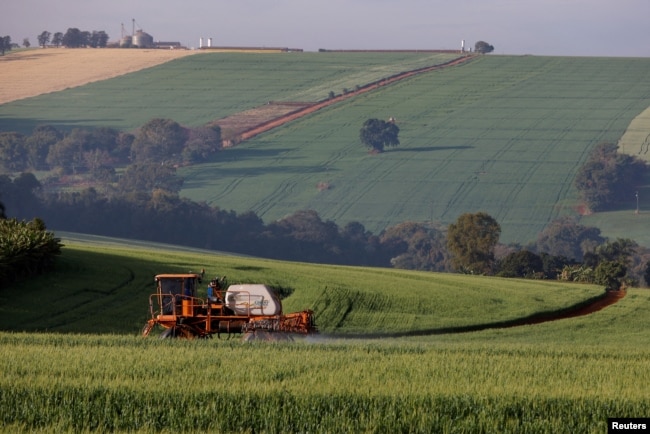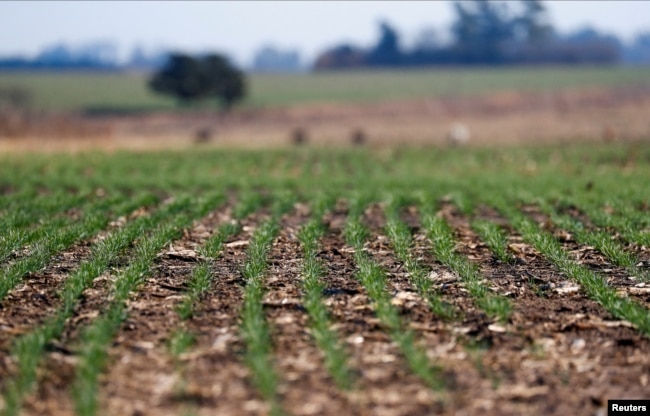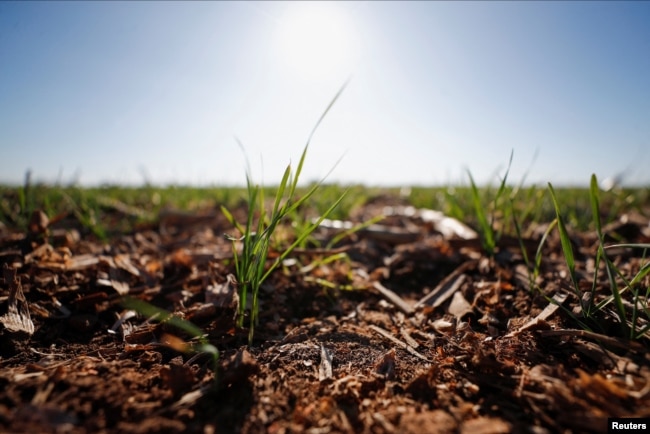Argentina Looks to Cross Wheat with Gene from Sunflowers

Argentina is one of the world’s top wheat producers, worth about $4.5 billion yearly to the country’s economy. But climate conditions like long periods of severe dryness and rising temperatures worry the country’s farmers.
Argentina is about to learn whether a genetically engineered new wheat might ease some agricultural concerns for the future.
Scientists and farmers in Argentina are testing a genetically modified version of wheat known as HB4. It uses a gene taken from sunflowers. If successful, Argentina could keep its position as one of the world’s top wheat exporters.
The gene from sunflowers is useful because the flowers can grow well in places where temperatures are high and water is not plentiful. The farmers in Argentina would like their wheat to grow the same way.
If the HB4 test is successful, Argentina might become the world’s first producer of this stronger kind of wheat. Scientists say the HB4 wheat should be able to produce 20 percent more than a traditional wheat crop under hot and dry conditions.
Argentina is the first nation to approve genetically modified wheat for commercial use. However, the product is not yet on the market.
Companies that support HB4 say having a stronger kind of wheat could help prevent food shortages during times of drought and war.
Right now for example, China and countries in North America and Europe are at lower than usual levels of wheat production because of drought. Russia’s war in Ukraine has also reduced the world’s wheat supply.
Many environmental and consumer groups question the safety and reasonability of modified grain. They suggest that an unexpected modification could hurt the supply of bread, pasta and other important foods. Agricultural companies, however, point to the success of genetically modified soy and corn that is often used to feed animals.
The Reuters news agency went to see the test wheat field in the Argentinian town of Pergamino. Argentinian company Bioceres planted the crop with the help of government scientists.
Raquel Chan is a biochemist and a researcher for a group run by the Argentinian government. She helped develop HB4. Bioceres then purchased the rights to work with the wheat strain.
The developers are doing their best to be sure the modified wheat does not contaminate other wheat.
Chan said some people do not understand enough about the modified wheat. She said the product is “almost indistinguishable” from traditional wheat.
Chan noted that such genetic change in nature is a very slow process.
“Normally, it takes thousands of years. We just did it faster,” she said
The wheat is also being tested in Brazil.
Julio Calzada is a chief economic expert in Argentina’s grain selling market in the port of Rosario.
He said there could be risk in planting the modified grain before world markets are ready for it. The main concern, he said, is that the traditional and modified grain could end up mixing.
“This could spark bans in international markets, and Argentina needs the $4.5 billion in exports. They’re key at such a complicated moment…” he said.
In the United States, the government recently gave permission to a number of companies to test modified wheat, records show. Reuters contacted those companies and they all said they do not plan to sell modified wheat.
Bioceres said it is trying to get permission from the governments in Australia and the U.S. to test HB4 in those countries.
The path to acceptance for modified wheat is a slow one. Indonesia, one of the top buyers of wheat from Argentina, said it would not yet purchase the HB4 wheat. But on the other hand, Brazil, another one of Argentina’s large customers, might soon approve HB4 wheat. Brazil already permits flour made from HB4 wheat.
Rubens Barbosa is the president of Brazil’s flour-making business group. He said the HB4 seeds will produce more wheat than regular seeds. He said it is worth being optimistic about Brazil’s ability to produce its own wheat if it starts using HB4.
In the fields where the HB4 wheat is planted, there are no special barriers keeping one field apart from another. But Bioceres pays farmers extra to be careful and keep track of the seeds and the modified wheat once it is harvested.
Federico Trucco is the leader of Bioceres. He said the special attention to the HB4 wheat helps people feel safe about the modifications. Trucco told Reuters he believes people around the world are starting to accept the idea of wheat that can grow under severe conditions.
Chan, the scientist who worked on the modification, said wheat has a protein that helps the plant grow if there is a reduction in water. But the addition of the gene from the sunflower is like what happens when a soccer team adds a player like Lionel Messi.
“The sunflower lends it a good gene. Imagine yourself as a team of soccer players … if you add in Messi to the mix you will obviously do better.”
I’m Caty Weaver. And I’m Dan Friedell.
Read also
Join with the EARLY RATE – 22 International Conference BLACK SEA GRAIN.EUROP...
China cuts 2024/25 corn production forecast in December outlook
USDA experts cut forecasts for world wheat production, consumption and exports, bu...
Ukrainian sugar exports may break the record for the last 24 years
Palm oil stocks in Malaysia in November fell to a minimum in the last 4 years
Write to us
Our manager will contact you soon






